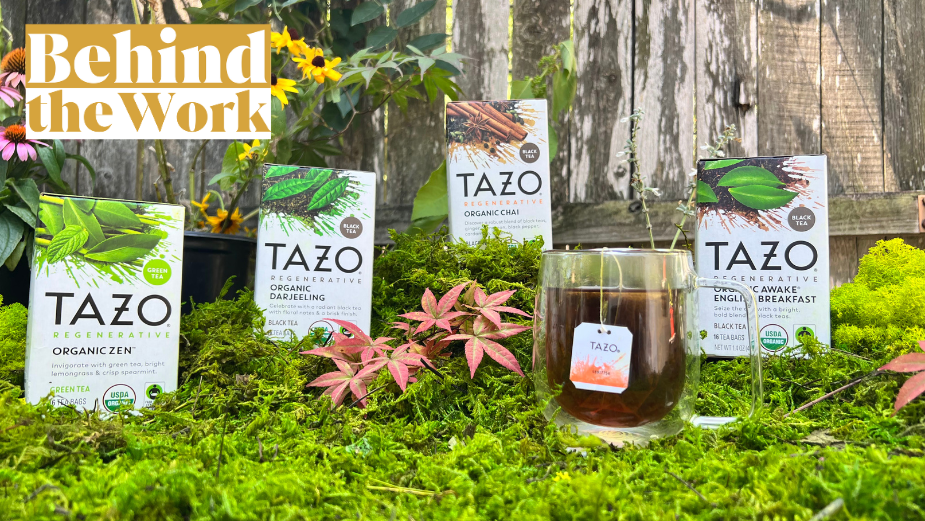
How TAZO Brewed a Regenerative Ad for Its Regenerative Tea

Production is one of the ad industry’s biggest energy users. So, as tea brand TAZO is currently amidst a multiyear portfolio transition towards becoming completely regenerative and organic, it teamed up with its creative AOR, Edelman, to extend this approach to its marketing.
Promoting Tazo’s line of regenerative, organic tea the ‘Click Here to Help Save the Planet’ TikTok campaign, directed by Camp Lucky’s Adam Littke, takes viewers on an educational journey to understand how the brand is achieving this – starting with the production of the very ad itself. Some of these energy-saving techniques highlighted in the social video include: shooting outdoors with natural light, filming locally at the director’s house with local talent, using vegan catering and more. The result, according to Edelman’s VP and creative director, Eden Feducia is an “ad-like-thing that bucks every traditional convention of an ad, in favour of getting people engaged with the concept of regenerative principals.”
To find out how this innovative regenerative production was put together, LBB’s Ben Conway spoke with Eden, the director and Jami Lewchik, head of TAZO and portfolio sustainability for ekaterra Americas.
LBB> So - a regenerative ad for a regenerative product - where did this idea come from?
Jami> We challenged ourselves to think beyond our tea products, and find ways for TAZO to help create a better future where both people and planet thrive – that includes our work to fight for climate justice and our commitment to transition to regenerative organic, which we’ve been working on for several years. TAZO looked to regenerative agriculture (a centuries-old agricultural approach originating from Indigenous farmers) to shape how we care for our ecosystem, including the people who rely on the land where our teas, herbs and spices are grown. We’re applying regenerative principles to how we operate our business, from how we source ingredients and packaging to where we direct our charitable giving.
We had a lot of fun making ‘regenerative’ come to life in our TikTok ad. From the set to the lighting to the crew (locally hired with an emphasis on BIPOC talent) and even to the crew meals. We worked to actively minimise our carbon output where possible and aimed to challenge the production industry status quo.
LBB> What were the biggest uses of energy that you identified in the production process and how did you cut them?
Eden> We focused our efforts on three of the most wasteful aspects of production: transportation, shoot location, and catering. The first two are related issues: transporting crew and clients to a location far from home accounts for about 80% of the carbon emissions on a typical film shoot. Then, if that location is a studio or soundstage, you’ve got the energy consumption of running lights, AC, generators and other energy-intensive equipment to account for. Catering might be the most intuitive: the free food is one of the best parts of being on set but it can also generate a ton of waste – we’ve all seen half the catering spread end up in the trash after wrap.
We cut 75% of our travel-related carbon output by sourcing a crew that was 100% local to our shoot location in Texas. We shot outdoors, eliminating the need to air condition a huge studio space, and relied primarily on natural light to eliminate power-hungry lighting setups. We went vegan with the catering to reduce its energy impact, offered reusable water bottles on set, and composted our food waste and service materials to divert as much as possible from the landfill. Finally, we discovered that the traditional media buy for an ad generates a ton of carbon output and pivoted our strategy to centre around an organic TikTok post, cutting back roughly another 100kg of CO2eqs.

LBB> Tell us a bit more about the TikTok strategy behind the campaign!
Jami> The energy consumed by broadcasting a single ad is equivalent to 144 round-trip flights from Paris to New York. So we scrapped our media plan and turned the ad itself into a fundraiser. And instead of forcing the ad into the feeds of tea drinkers via paid media, we asked consumers, social media users, and environmentalists to watch it by choice in exchange for a one dollar donation. Every view of the ad was a $1 donation up to $250,000 to Rodale Institute, a non-profit and global leader in regenerative organic agriculture for 75 years, which will support education, research and farmer training and transition support to regenerative organic agriculture.
We posted a single TikTok video and Green-Tok did the rest – farmers, marketers, and GreenTok activists shared our campaign, including the preeminent environmentalist drag queen, Pattie Gonia, who reposted our entire regenerative ad on their channels. We quickly blew through our campaign goals, unlocking the $250,000 donation to the Rodale Institute. This donation builds on TAZO’s 2022 $1.4m commitment to supporting mission-aligned organisations every year moving forward through our partnership with 1% for the Planet.
This year and last, we’ve worked with Rodale and the Organic Farmers Association to help support small-scale BIPOC farmers in their journey towards organic farming, with a micro-grant program. It’s a great opportunity for BIPOC farmers who are just starting the transition towards organic farming or those who are already established.
LBB> What were the most innovative or DIY solutions that you came up with for certain problems?
Eden> Some of my personal favourite solutions were our most lo-fi. The whole crew really rallied with us around this idea of making a regenerative ad and got their hands dirty (sometimes literally) trying to figure out how to bring that dream to life. Our production designer had the amazing idea of literally planting local, pollinator-friendly bushes to create this living green backdrop that shot beautifully but is also still continuing to give back to the ecosystem today, long after we’ve wrapped the shoot. For me, that really embodied the goal which is not just to curb our impact but to be regenerative, to leave the planet net-positive as a result of our work.
Adam> Shooting in my backyard was a really fun addition. It created a ‘family-like’ atmosphere on set and provided some humour as well. I’m really proud of our solar lighting approach too. All of our electrical needs were provided by a solar panel that we set up in my backyard. I also loved using my son’s kiddie pool as a reflective light source for the product shoot.

LBB> What posed the biggest challenge on this set? How did you overcome it?
Eden> Our biggest challenge overall was the uncharted territory of this concept, there aren’t a lot of folks with experience trying to pull off regenerative productions so there was no real template to follow. It impacted everything – for example, the pre-production process was a lot longer than usual because we were scrutinising a hundred decisions we usually make on autopilot, like where to order catering from or which studio to book, trying to optimise those to be as planet-positive as possible.
In some ways, the more we dug into the process of reducing our production’s impact, the simpler it seemed. Obviously it’s bad for the earth if we use plastic utensils to feed a whole crew, obviously it’s bad to fly 10 people halfway across the country for a shoot... Those are all things our industry can pivot away from fairly easily just by raising awareness of their environmental impact. These things become obvious if we’re thinking about them proactively, the question really becomes: Are we?
LBB> Have you adopted these changes going forward? What’s stopping a more industry-wide adoption of regenerative/environmentally friendly production practices?
Adam> This was a first for me. With a little more planning and patience, our production team was able to thoughtfully change decades-old structures. Our production teams are very thorough in all aspects, and adding a few steps ahead of the shoot created great connections between our crew.
Making a fully regenerative ad for a regenerative product was one of the most rewarding yet challenging jobs of my career. Since the TAZO shoot, my production company has implemented the composting of unused food on all of our shoots. I’m really proud of this change.

Eden> At the end of the day, big industry-level changes are driven by the decisions of individuals. We change systemic processes when regular people decide to make the climate crisis their problem at work - it’s a creative director writing a spot that can be shot outdoors, a producer scouting a location that limits crew travel, an account lead convincing the client they don’t need to fly five people to set for a shoot.
When we talk about these issues we’re quick to forget that ‘the ad industry’ is literally us. There’s not someone else we should be waiting for to spearhead this kind of change. It’s you, it’s me, it’s Carl from accounting. We don’t have to be working on a campaign for a brand with regenerative practices to embrace these production changes - just as we don’t have to be environmental experts to help avoid climate catastrophe.
If you want to make your next campaign regenerative, you can start by making a few straightforward suggestions in your three o’clock meeting today.
LBB> The human impact was also considered on this project - for example, childcare and other support for the crew. How did you identify and organise this element of the campaign?
Eden> This came about really naturally, to be honest. We were inspired by how wide-reaching TAZO’s regenerative commitments are, which really go beyond just carbon reduction and soil-health initiatives to consider the impact their production has on the lives of people employed across the supply chain. In that same spirit, we worked closely with Adam to identify where we could offer flexibility to the crew, or additional support, and just generally make the shoot a positive part of their lives. Childcare came up immediately, it’s one of the biggest barriers to employment across industries in the US and a place where we cut a ton of talented folks out of the workforce. Being able to offer flexibility on that front, even just for this one small job, was awesome.

LBB> How will TAZO continue to develop its sustainability initiatives - not just with its products, but with its future marketing too?
Jami> As we continue our regenerative transition, we’re targeting two focus areas:
1. Helping to replenish the planet and its resources: We are working to protect nature, including ultimately getting to net-zero emissions and helping support biodiversity, improve soil health, and protect waterways. By 2025, 100% of our packaging will be reusable, recyclable, or compostable, and by 2030, we aim for a 45% absolute reduction of Scopes 1, 2, and 3 greenhouse gas emissions as compared to the 2020 base year.
2. Helping to build resilient communities: We invest in solutions that support and are led by communities in our value chain, including those disproportionately impacted by the climate crisis. A top priority is the people growing our tea, herbs, and spices. This work begins with the Fair Trade USA certification and extends to address on-the-ground challenges through partnerships with experts and more. By 2026, TAZO commits to helping at least 250,000 smallholder farmers and women and girls in tea and herbal tea-producing regions have better lives, through support training and programs.
We are also continuing to build upon our partnerships with like-minded organisations in the environmental/sustainability/justice space through our partnership with 1% for the Planet. Of our annual sales, 1% goes directly towards TAZO’s nonprofit partners - organisations fighting for issues including climate justice, tree equity, social justice and human rights. And we’ll be continuing to work with Pure Strategies, a sustainability consulting firm that helped us get to this point, to measure our progress on our goals.















